#famine in Ukraine
Text
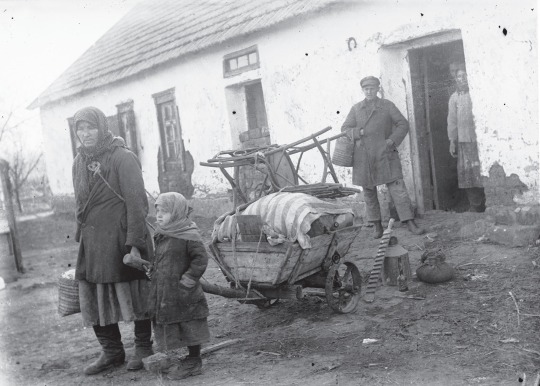
Taken in Donetsk in 1932-33, this photograph shows a “kulak” woman and her small child being evicted from their home in winter, dispossessed of everything but a small wagonload of their belongings pulled by hand behind them. Photo by Marko Zhelizniak.
This is the people tankies would want you to believe had the Marie Antoinette level of luxury. I wonder how many carts like those would be required to transport everything an average western tankie owns.
#ukraine#russia#ussr#history#holodomor#concentration camps#communism#famine#artificial famine#ukrainian history#joseph stalin
693 notes
·
View notes
Text

(c) Oleksiy Kustovsky
Holodomor Remembrance Day: Each year on the fourth Saturday of November Ukraine commemorates the victims of the mass artificial famines (Holodomor) of 1921-1923, 1932-1933 and 1946-1947, organised by the Soviet Union authorities, as a result of which the Ukrainian people lost millions of lives.
#ukraine#украина#україна#russia#россия#росія#ussr#stalin#kremlin#holodomor#famine#genocide#срср#ссср#сталин#сталін#голодомор#голод#геноцид#кремль#art#illustration#арт#иллюстрация#ілюстрація
197 notes
·
View notes
Text
History Wizard on TikTok
7 notes
·
View notes
Text
Famine belongs to the Communist tetrarchy — the other three elements being terror, slavery and, of course, failure, monotonous and incorrigible failure.
— Martin Amis, from Koba the Dread: Laughter and the Twenty Million
52 notes
·
View notes
Text

LETTERS FROM AN AMERICAN
November 26, 2023
HEATHER COX RICHARDSON
NOV 27, 2023
A four-year-old dual Israeli-American citizen was among the 17 more hostages released by Hamas today. Israel released 39 Palestinian prisoners, all of whom were under 19 years old. Hamas has expressed interest in extending the truce; Israeli prime minister Benjamin Netanyahu has echoed that interest so long as each day brings at least ten more hostages out of captivity. Officials from the U.S., Egypt, and Qatar continue to negotiate.
In the Washington Post today, reporters Steve Hendrix and Hazem Balousha put on the table the idea that both Netanyahu and Hamas “may be on the way out.” Such a circumstance would permit changes to the current political stalemate in the region, perhaps bringing closer the two-state solution for which officials around the world, including U.S. president Joe Biden, continue to push.
Israelis are furious that Netanyahu failed to prevent the October 7 attack, and seventy-five percent of them want him to resign or be replaced when the crisis ends. At the same time, Hendrix and Balousha write, Palestinians are angry enough at Gaza’s leadership to be willing to criticize Hamas.
Whether Hendrix and Balousha are right or wrong, it is significant that a U.S. newspaper is looking for a change of leadership in Israel as well as in Gaza. That sentiment echoes the statement of Netanyahu’s own mouthpiece, Israel Hayom, about a month ago. Begun by U.S. casino mogul Sheldon Adelson to promote Netanyahu’s ideas, the paper in early November said that Netanyahu should “lead us to victory and then go.”
Meanwhile, Iran-backed Houthi forces from Yemen fired two ballistic missiles at a U.S. Navy destroyer, the USS Mason, this evening, missing it by about ten nautical miles (which are slightly longer than miles on land), or eighteen and a half kilometers. Earlier in the day, the USS Mason and Japanese allies rescued a commercial vessel, the Central Park, when it came under attack by five pirates in the Gulf of Aden near Somalia. The USS Mason captured and arrested the attackers as they fled. The USS Mason is part of the Dwight D. Eisenhower Carrier Strike Group deployed to the region. Attacks on shipping in the area have increased since the October 7 attack. Last week, Yemeni Houthis seized a cargo ship linked to Israel.
As Congress prepares to get back to work after the Thanksgiving holiday, Senate majority leader Chuck Schumer (D-NY) today released a letter addressed to his colleagues outlining the work he intends to get done before the end of the year. He emphasized that he and the Democrats want bipartisan solutions and urged his colleagues to work with Republicans to isolate the Republican extremists whose demands have repeatedly derailed funding measures.
Top of Schumer’s list is funding the government. The continuing resolution that passed just before Thanksgiving extended funding deadlines to two future dates. The first of those is January 19, and Schumer noted that lawmakers had continued to work on those bills over the Thanksgiving holiday to make sure they pass.
Next on Schumer’s list is a bill to fund military aid to Ukraine, Israel, and the Indo-Pacific region as well as humanitarian assistance for Palestinian civilians and money for U.S. border security, including funding for machines to detect illegal fentanyl and for more border agents and immigration courts. President Biden requested the supplemental aid package of about $105 billion back in October, but while the aid in it is popular among lawmakers, hard-right Republicans are insisting on tying aid for Ukraine to a replacement of the administration’s border policies with their own. Some are also suggesting that helping Ukraine is too expensive.
Schumer noted that U.S. aid to Ukraine is vital to its ability to continue to push back the Russian invasion, while Senate minority leader Mitch McConnell (R-KY) has pointed out that money appropriated for Ukraine goes to the U.S. defense industry to build new equipment as older equipment that was close to the end of its useful life goes to Ukraine.
Foreign affairs writer Tom Nichols of The Atlantic explains that foreign aid is normally about 1% of the U.S. budget—$60 billion—and 18 months of funding for both the military and humanitarian aid in Ukraine have been about $75 billion. Israel usually gets about $3 billion; the new bill would add about $14 billion to that. (For comparison, Nichols points out that Americans last year spent about $181 billion on snacks and $115 billion on beer.)
Schumer reminded his colleagues that backing off from aid to Ukraine would serve the interests of Russian president Vladimir Putin; backing off from our engagement with the Indo-Pacific would serve the interests of China’s president Xi Jinping.
“The decisions we will have to make in the coming weeks on the aid package could determine the trajectory of democracy and the resilience of the transatlantic alliance for a generation,” Schumer wrote. “Giving Putin and Xi what they want would be a terrible, terrible mistake, and one that would come back to haunt us…. We cannot let partisan politics get in the way of defending democracy….”
Schumer said he would bring the measure up as soon as the week of December 4.
Schumer’s letter came the day after the annual day of remembrance of the 1932–1933 Holodomor famine in Ukraine, when the Soviet Union under leader Joseph Stalin starved 3.5 to 5 million Ukrainians, seizing their grain and farms in an attempt to erase their national identity.
In a statement in remembrance of Holodomor yesterday, President Biden drew a parallel between the Holodomor of the 1930s and Russia’s war against Ukraine today, noting that “Ukraine’s agricultural infrastructure is once more being deliberately targeted” as Russia is “deliberately damaging fields and destroying Ukraine’s grain storage facilities and ports.” (Even so, Ukraine has managed to deliver more than 170,000 tons of grain to Somalia, Ethiopia, Kenya, and Yemen in the past year.)
“On this anniversary, we remember and honor all those, both past and present, who have endured such hardship and who continue still to fight against tyranny,” Biden said. “We also recommit ourselves to preventing suffering, protecting fundamental freedoms, and responding to human rights abuses whenever and wherever they occur. We stand united with Ukraine.”
On the Ukrainian remembrance day of Holodomor, Russia launched 75 drones at Kyiv, its largest drone strike against Ukraine since the start of its invasion in February 2022.
LETTERS FROM AN AMERICAN
HEATHER COX RICHARDSON
#Letters From An American#Holodomor#Ukraine#war#hostages#diplomacy#Joe Biden#Heather Cox Richardson#history#famine
16 notes
·
View notes
Text
Today, a rather predictable statement came from Russia – a statement that they are finally canceling the grain export initiative. But in fact, this is not the decision they made today.
Russia began deliberately aggravating the food crisis back in September, when it blocked the movement of ships with our food. From September to today, 176 vessels have already accumulated in the grain corridor, which cannot follow their route. Some grain carriers have been waiting for more than three weeks. Algeria, Egypt, Yemen, Bangladesh, Vietnam, others countries – very different countries, from different parts of the world... But they can all be equally destabilized by this Russian decision to block exports.
Why a handful of people somewhere in the Kremlin can decide whether people in Egypt or Bangladesh will have food on their tables? A strong international response is needed now. Both at the UN level and at other levels. In particular, at the level of the G20.
Ukraine has been and can continue to be one of the guarantors of global food security. Russian terror and blackmail must lose. Humanity must win. I thank everyone who is fighting with us to restore peace and stability to international relations!
- Volodymyr Zelenskyy, 29.10.2022
#russia is a terrorist state#food insecurity#russia wants global famine#russian war against ukraine#food crisis
87 notes
·
View notes
Text
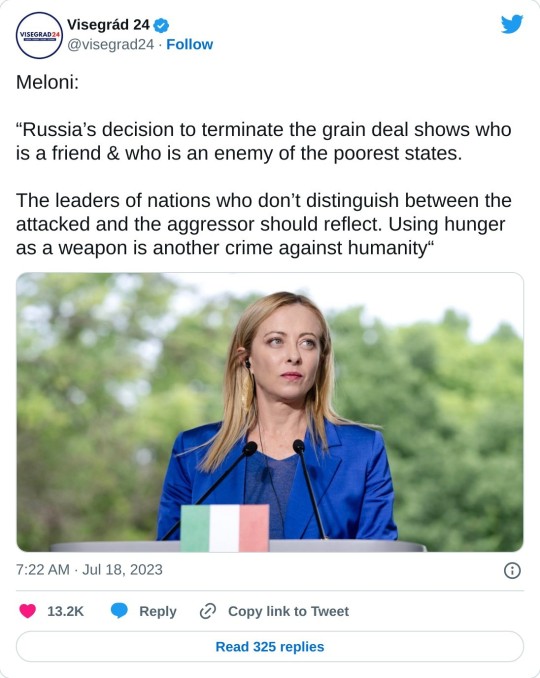
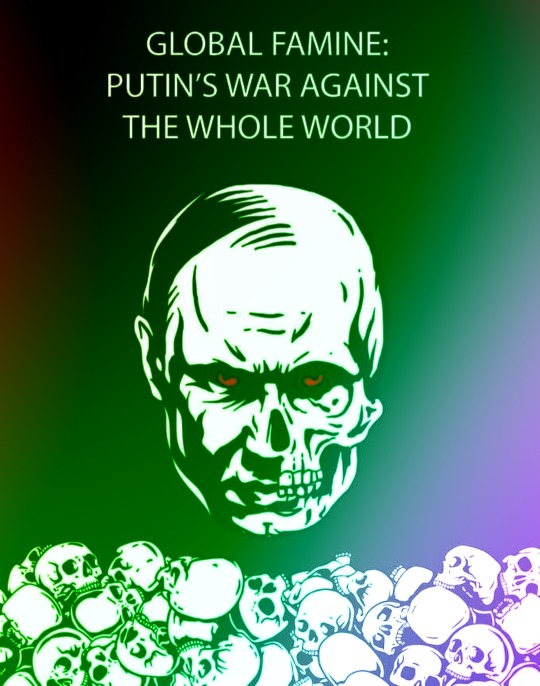
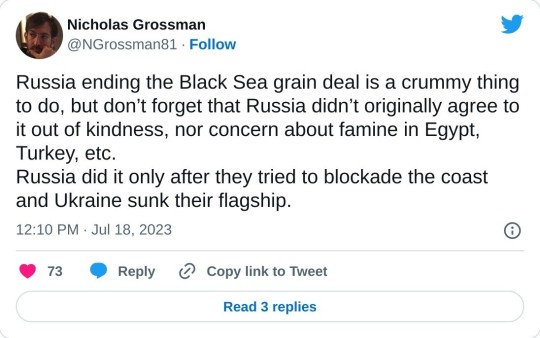
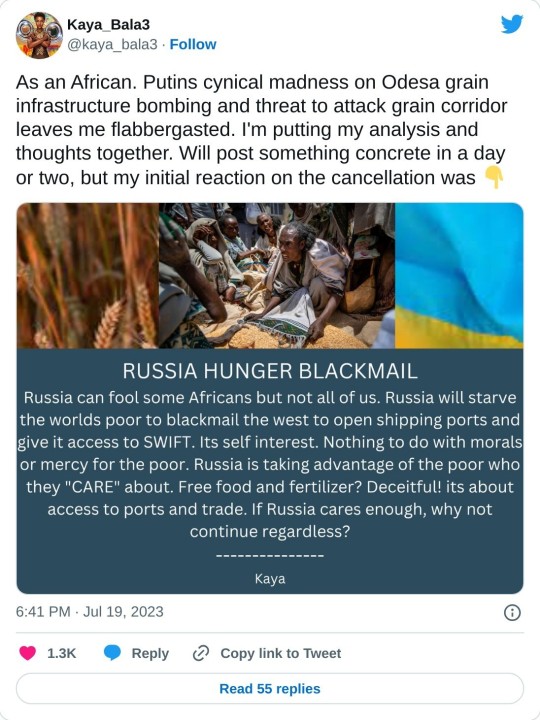
#russian hunger black mail#meloni#black sea grain deal#global famine by putin#ukraine resistance#stop russian invasion#putin war criminal#stop putin#ukraine war#help ukraine#give weapons to ukraine#i stand with ukraine#slava ukraini#african famine
15 notes
·
View notes
Note
The Holodomor happened and Stalin could've avoided or stopped it at any time
Oooo, something I know a lot about!
Well, there is a half truth here, which is that, yes, yet another famine did indeed occur in Ukraine in the 1930s along with the greater Soviet region, as famines occured there repeatedly for many centuries, and this famine did indeed kill people.
This cycle of famine killed millions for hundreds of years under various tsars. And yet, less than a few decades after the Soviets took power, the cycle of famine was finally broken, and starvation in the region became a distant memory. The famine you call the "Holodomor" was one of the very last of these famines that the Communists worked diligently to prevent and alleviate--even during times of war and barbaric invasion and strangling siege from the world powers--and who the first finally successful in doing so.
So, how did this story get twisted from "the Soviets finally ended a brutal cycle of famine that the tsars did nothing about," to, "Joseph Stalin created a man-made famine to purposefully kill Ukranians in a campaign of genocide and terror"?
Let's talk about kulaks, international rightwing news, and then finish off with miscellaneous factors that exacerbated the famine and slowed Soviet response to it.
When the impoverished and starving masses of the Russian Empire and its colonies, led by the Bolsheviks, arose in a popular revolution a decade prior to seize society for themselves to build the socialist Union, there were many who fought quite viciously to stop this People's Government from coming to or keeping power. The remnants of the tsarist government, big corporations, fascists, white supremacists, the Orthodox Church hegemony, and opportunists all took money, weapons, training, soldiers, resources and other support from European and American monarchies/rulers and international corporations who had colonial interests in tsarist Russia and its own colonies; those who had a vested interest in keeping the Soviet people oppressed and suffering, from Russia to Ukraine to Kazakhstan, Belarus, Uzbekistan, Siberia, Georgia, Lithuania, and others. These counter-revolutionaries, this coalition of fascists and capitalists supported by or directly from the Western imperial powers, these people murdered civilians, minorities, and elected government officials in terror attacks, bombings, shootings, pogroms. They destroyed trains, granaries, farming equipment, factory equipment, tools, spare parts, buildings, homes, power grids, water pumps--this was a war directly on the masses, on the populace. This war on the life of the Soviet people themselves was most fierce in the civil war against the Whites (the tsarist remnants), and particularly in the genocidal Nazi invasion, but it continued for the entirety of the USSR's existence--and slowed but didn't stop even when the Union dissolved and the ex-Soviet states became capitalists or fascists themselves, up to this very day, manifest in NATO plans to balkanize and neoliberally colonize modern capitalist Russia.
One of the most despicable cases of this sabotage against the new, aspiring egalitarian society was the kulaks and what they did during these times of famine.
The Soviets had collectivized the land and the food, and began distributing it evenly to the peasants who had toiled in serfdom these lands for generations without reward; in essence, confiscating lands from wealthy slaveowners and giving the farmlands to the slaves, and ensuring those who were most vulnerable to starvation (such as during hard winter months, or famines) always had access to the bare necessities to live.
So, what did the kulaks do in response to this confiscation and just redistribution?
They burned their own crops. They killed their own cattle and horses and chickens and pigs by the herd. All to spite the new government of the people--and all leading up to and in the middle of this famine you reference as the "Holodomor."
So, we have a region that has historically suffered from famine repeatedly for centuries, and right when they are due for another one, a class of people that amount to slaveowners and landlords and those that aspire to be like them starts sabotaging a socialist government by destroying food en masse.
Sure enough, famine hit, and large amounts of people died.
See, and this is where rightwing news sources come into play.
As referenced, there were many monarchist, capitalist, and fascist interests involved in destroying the socialist experiment from its birth until long after its death.
One microcosm of this genocidal hatred was the fake news. Anybody with even a moderate grasp on history and the realities of the modern day knows that any leftwing governments, movements, or individuals are subject to lies and deceit of their rightwing adversaries. 1930s Eastern Europe was no different. Sourced that were dismissed unanimously at the time even by liberals and conservatives alike as rightwing tabloids--the Breitbarts and Stormfronts and Fox Newses and 4chans and OANs of the day--all began inventing stories of thousands, no, hundreds of thousands, no, MILLIONS, NO, TENS OF MILLIONS of dead littering the dirt roads of Ukraine--a claim quickly debunked by several verified reports at the time from independent journalists, diplomats, and travelers of various nationalities and political predilections at the time.
And yet, what amounted to flat earth conspiracy in the 1930s got a veneer of trustworthiness as its newspaper pages yellowed charmingly with age, and after urgings by the CIA, began to be used as legitimate sources cited in scholarly articles in Ivy League campuses. The Banderites, a sect of Ukranian Nazi collaborators in WW2 who joined the German Nazis in raping, pillaging, and murdering their own countrymen, also spent their every waking moment pushing for decades pushing these otherwise contemptible narratives riddled with errors and blatant fabrication, forgery, and theft--pictures used from completely different famines in completely different countries, tallies of dead that do not match birthrates and subsequent censuses by the tune of millions of people, completely invented and unverifiable names of imaginary interviewees, even the supposed TRAIN SCHEDULES of these supposed "journalists" have been debunked to the point of proving none of them even set foot in Ukraine SSR or anywhere else nearby.
Suddenly, what was correctly seen by all normal people as total BS in the 1930s, after a century of legwork, suddenly was trustworthy primary sources that were cited by Harvard professors, and then American diplomats, and then Wikipedia, and now everybody on the Internet who recounts the tale of Stalin's genocide on the Ukranian people--an idea alone that is complete nonsese when one considers the vast resources that leaders such as Stalin invested into ENDING these famines, developing Ukraine, and feeding ALL the people within the Soviet Union, all at the EXPENSE of the Russian body.
The repeated behaviors of the Soviets show them to be concerned with helping the masses achieve the basic necessities of living, they show a longstanding love and comraderie between Ukraine and Russia, they show intense efforts to end natural disasters such as famine. The repeated behaviors of the USSR's enemies show a bunch of cowards who will stop at nothing, lying and destroying to sabotage anything even remotely leftwing that threatens their colonial interests, such as a large unified Eurasian world power that refuses to allow multinational corporations to have a blank check robbing their people for cheap labor or resources.
To let off the gas pedal and reach a stopping point, I must pay homage to some other factors.
The experiments of Soviet scientist Lysenko, one of those tasked with ending such famines and industrializing agriculture to a scale that could quickly feed the entire Soviet people, were a failure, and likely contributed to the predestined famine that struck 1930s Ukraine. While many valuable lessons were gleaned from the failure of Lysenkoism, it is no doubt that its failure may have exacerbated the famine.
There is also the question of the struggling, newly born Soviet state to modernize in its early days. There was some telegrams, but most communication still had to be done by horseback mail carriers, and telephones were barely a thing at all yet. News traveled slow through the mountains, steppes, tundras and forests.
Finally, there is a legitimate question as to mid-level Soviet officials being negatively motivated to exaggerate or outright lie to meet their quotas. While early Soviet history is filled with comraderie, cooperation, bravery, justice, determination, and communal compassion, it is also simultaneously, due to the extreme pressure from international invasion, civil war, sabotage, and the like, an era of violence, mistrust, paranoia, disloyalty, volatility, and a lack of confidence. Many of this Soviet officials feared failing their country, they feared losing their positions, many even feared overzealous higher-ups would deem their failures to be intentional, proclaim them a traitor, and imprison or kill them--it was difficult to tell during this time who was collaborating with or sympathetic to the enemy, who was being paid by foreign agents, who was an opportunist enriching themselves, and in this confusion and militant attempt to keep the ship from sinking, there are tales of innocents whose lives were ruined or even stolen from them. Many mid-level Soviet officials assigned to keep track of the region misrepresented and padded their numbers to make it appear things were well on-par with Soviet objectives. Thus, grain was exported even when the famine was full swing, because the reality of the famine--especially when combined with the slow-travelling news--had yet to truly sink in to the Soviet leadership.
In closing, the following:
Mistakes were certainly made, and many people died--the true number is hard to determine. However, what is sure is that modern Western estimates are grossly distorted. The famine of Ukraine in the early 1930s was one of the last of its ilk due to the diligent work of the Communist government to destroy the cycle of famine, and they eventually succeeded, and not only Ukraine but the entire multinational, multiethnic Soviet Union and its hundreds of millions of people never suffered starving or food insecurity for the rest of the Union's existence.
#ukraine#ukraine war#holodomor#famine#genocide#stalin#back in the ussr#ussr history#countryhumans ussr#ussr#russian invasion of ukraine#nato#fake news#world history#soviet#soviet union#communism#socialism#tankies#marxism leninism
3 notes
·
View notes
Text
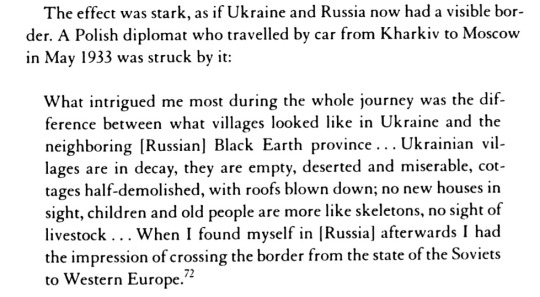
- Anne Applebaum. The Red Famine: Stalin's War on Ukraine
Gonna keep this quote for every person who says "but there was famine in russia too!!"
#ukraine#russia#ussr#history#holodomor#anne applebaum#communism#genocide#famine#ukrainian history#joseph stalin
208 notes
·
View notes
Text

57 notes
·
View notes
Photo

Holodomor Commemoration Day (26.11.2022). Infographic by Euromaidan Press
#Ukraine#Holodomor#ussr#stalin#totalitarianism#dictatorship#Украина#Україна#Голодомор#ссср#срср#сталін#сталин#тоталітаризм#тоталитаризм#голод#диктатура#famine#history#infographic#история#історія#інфографіка#инфографика
248 notes
·
View notes
Photo

#ukraine#russia#famine#genocide#western europe#once an imperialist always an imperialist apparently#rape#war crimes
86 notes
·
View notes
Text
Ukraine War: The Grain Crisis and Mass Famine
Ukraine War the Grain Crisis and Mass Famine and how it will be affecting the most in the case of China and Africa.
Russia announced on Monday, 17 July 2023, that the Black Sea grain deal would not be extended since the start of the Ukrainian conflict in 2014 with the seizure of Crimea and the launch of a full-scale Russian invasion of Ukraine in 2022 in February of that year has been renewed on average within 105 days.
The trade agreement allowed Ukrainian great exports you pass from southern parts of…
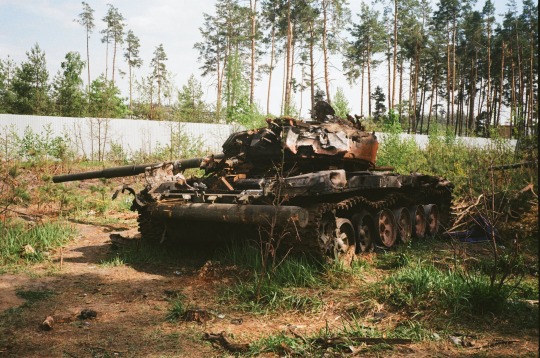
View On WordPress
#Agriculture#Grain Crisis#Invasion of Ukraine#Mass Famine#Poor Nations#Ukraine War#Vladimir Putin#wheat
4 notes
·
View notes
Text
Question for the Indians, Irish, and the Ukranians
From what I've read the Irish view the Bengali Famine as a genocide and the Indians view the Irish Potato Famine as genocide so do they both view the Holodomor as a genocide and do the Ukrainians view the Bengali and Irish Potatoe Famines as genocides
9 notes
·
View notes
Text
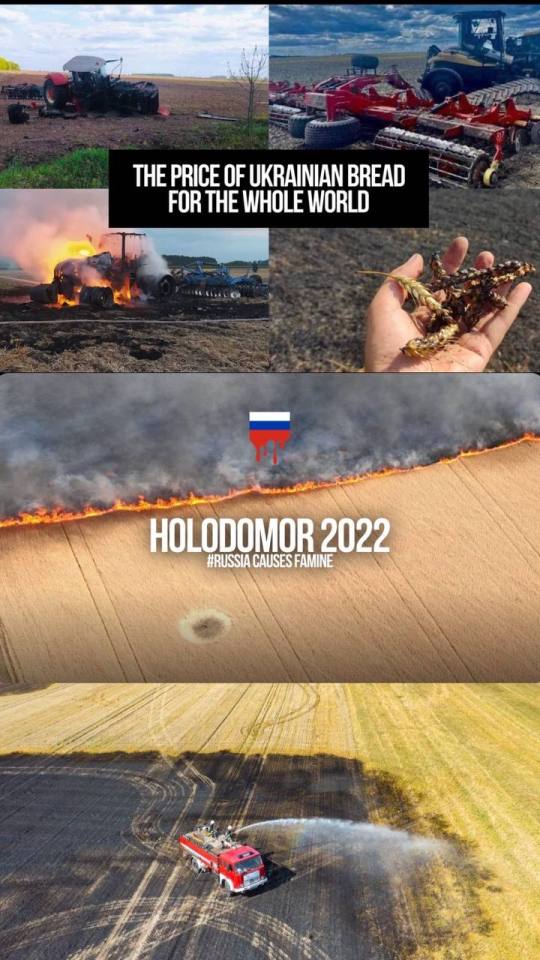
#ukraine#stand with ukraine#world news#stop russia#russia is a terrorist state#stop russian aggression#stop putin#new york times#stoprussizm#russia ukraine war#russia causing famine
44 notes
·
View notes
Photo

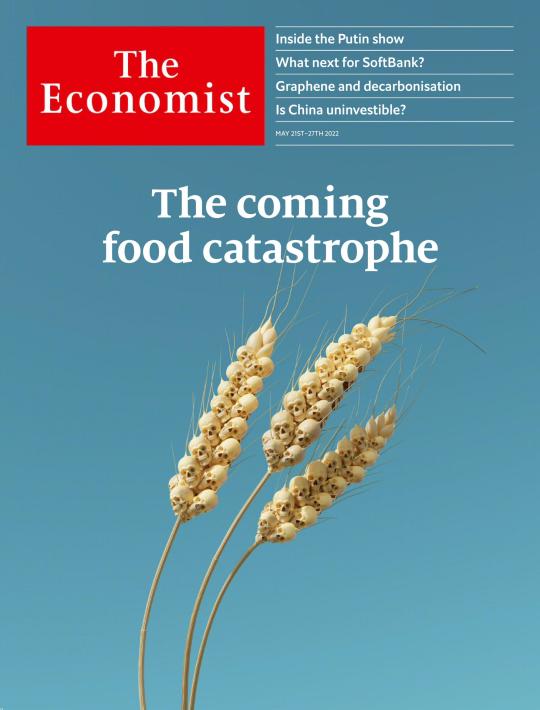
Ricardo Rey - Cover visual for The Economist Weekly, May 21 2022: The coming food catastrophe. Art Director Graeme James. Source.
29 notes
·
View notes